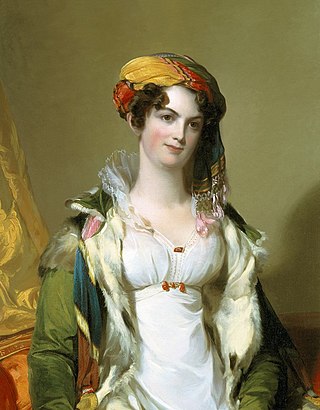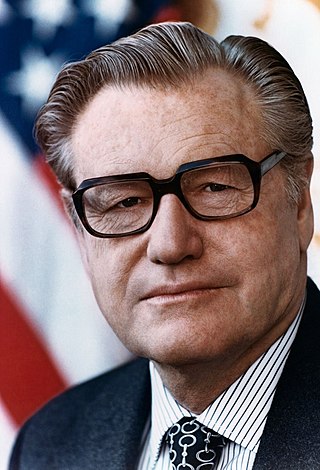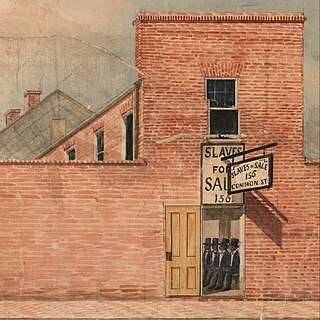
The Act Prohibiting Importation of Slaves of 1807 is a United States federal law that prohibited the importation of slaves into the United States. It took effect on January 1, 1808, the earliest date permitted by the United States Constitution.

Charleston is the most populous city in the U.S. state of South Carolina, the county seat of Charleston County, and the principal city in the Charleston metropolitan area. The city lies just south of the geographical midpoint of South Carolina's coastline on Charleston Harbor, an inlet of the Atlantic Ocean formed by the confluence of the Ashley, Cooper, and Wando rivers. Charleston had a population of 150,227 at the 2020 census. The population of the Charleston metropolitan area, comprising Berkeley, Charleston, and Dorchester counties, was estimated to be 849,417 in 2023. It ranks as the third-most populous metropolitan statistical area in the state, and the 71st-most populous in the United States.

St. Andrew's Hall was a public building in Charleston, South Carolina, on Broad Street. The hall served as headquarters for the St. Andrew's Society of Charleston, South Carolina. It was also an important part of the social life of upper-class Charlestonians. It was used for balls, banquets, concerts, and meetings of organizations like the South Carolina Jockey Club and the St. Cecilia Society. The hall could also be used for lodging, and both President James Monroe and General Marquis de Lafayette stayed there.

The Gibbes Museum of Art, formerly known as the Gibbes Art Gallery, is an art museum in Charleston, South Carolina. Established as the Carolina Art Association in 1858, the museum moved into a new Beaux Arts building at 135 Meeting Street, in the Charleston Historic District, in 1905. The Gibbes houses a premier collection of over 10,000 works of fine art, principally American works, many with a connection to Charleston or the South.

Hibernian Hall is a historic meeting hall and social venue at 105 Meeting Street in Charleston, South Carolina, United States. Built in 1840, it is Charleston's only architectural work by Thomas Ustick Walter, and a fine example of Greek Revival architecture. The wrought iron gates were made by Christopher Werner, a German-American master ironworker in Charleston.

The history of Charleston, South Carolina, is one of the longest and most diverse of any community in the United States, spanning hundreds of years of physical settlement beginning in 1670. Charleston was one of leading cities in the South from the colonial era to the Civil War in the 1860s. The city grew wealthy through the export of rice and, later, sea island cotton and it was the base for many wealthy merchants and landowners. Charleston was the capital of American slavery.

In the United States, abolitionism, the movement that sought to end slavery in the country, was active from the colonial era until the American Civil War, the end of which brought about the abolition of American slavery, except as punishment for a crime, through the Thirteenth Amendment to the United States Constitution.

The history of the University of Virginia opens with its conception by Thomas Jefferson at the beginning of the early 19th century. The university was chartered in 1819, and classes commenced in 1825.
Manisha Sinha is an Indian-born American historian, and the Draper Chair in American History at the University of Connecticut. She is the author of The Slave's Cause: A History of Abolition (2016), which won the Frederick Douglass Book Prize.

Jews have inhabited the Southern United States since the late 1600s and have contributed to the vibrant cultural and historical legacy of the South in many ways. Although the United States' Jewish population is more often thought to be concentrated in Northern cities, such as New York, thousands of Jewish immigrants chose to settle in the more rural Southern United States forming tight-knit religious communities and creating a unique cultural identity. Jewish immigrants came to the South from various countries, backgrounds and religious traditions within Judaism. Major Jewish communities include Memphis, Tennessee; Houston, Texas; Savannah, Georgia; Charleston, South Carolina; Charlottesville, Virginia; and Wilmington, North Carolina. Jews participated in many important events in Southern history, such as the Civil War, the World Wars, and the civil rights movement.

The planter class was a racial and socioeconomic caste which emerged in the Americas during European colonization in the early modern period. Members of the caste, most of whom were settlers of European descent, consisted of individuals who owned or were financially connected to plantations, large-scale farms devoted to the production of cash crops in high demand across Euro-American markets. These plantations were operated by the forced labour of slaves and indentured servants and typically existed in tropical climates, where the soil was fertile enough to handle the intensity of plantation agriculture. Cash crops produced on plantations owned by the planter class included tobacco, sugarcane, cotton, indigo, coffee, tea, cocoa, sisal, oil seeds, oil palms, hemp, rubber trees, and fruits. In North America, the planter class formed part of the American gentry.

James Henry Ladson was an American politician, wealthy plantation owner from Charles Town and officer of the American Revolution. He served as the Lieutenant Governor of South Carolina from 1792 to 1794, and was a member of the South Carolina state Senate from 1800 to 1804.
James Henry Ladson (1795–1868) was an American planter and businessman from Charleston, South Carolina. He was the owner of James H. Ladson & Co., a major Charleston firm that was active in the rice and cotton business, and owned over 200 slaves. He was also the Danish Consul in South Carolina, a director of the State Bank and held numerous other business, church and civic offices. James H. Ladson was a strong proponent of slavery and especially the use of religion to maintain discipline among the slaves. He and other members of the Charleston planter and merchant elite played a key role in launching the American Civil War. Among Ladson's descendants is Ursula von der Leyen, who briefly lived under the alias Rose Ladson.

Sarah Reeve Ladson (1790-1866) was an American socialite, arts patron, and style icon. Born into a prominent Charleston family, she was an influential member of the South Carolinian planter class. She was regarded as one of the most fashionable American women of her time and was the subject of various portraits and sculptures.

Slavery as a positive good in the United States was the prevailing view of Southern politicians and intellectuals just before the American Civil War, as opposed to seeing it as a crime against humanity or a necessary evil. They defended the legal enslavement of people for their labor as a benevolent, paternalistic institution with social and economic benefits, an important bulwark of civilization, and a divine institution similar or superior to the free labor in the North.

The President of Stony Brook University serves as the university's Chief Executive Officer. Stony Brook's President, in addition to his or her duties to the university's many academic programs, also oversees the Stony Brook University Hospital with its five health science programs and 120 community-based service centers. The President additionally plays an integral role in the economic development of Long Island, New York through Stony Brook's capacity as co-manager of the Brookhaven National Laboratory.
What will be required is a new attitude toward public higher education, a new state of mind, a new desire to put some real meaning into the motto inscribed in the seal of the State University of New York which says “Let each become all he is capable of being."

Elizabeth Wragg Manigault was an American socialite who was prominent figure in colonial South Carolinian society. She was the wife of Peter Manigault, who served as Speaker of the South Carolina House of Representatives and was one of the wealthiest people in British North America.

Isabella Gibbons was an enslaved woman serving as a cook at the University of Virginia, in Charlottesville, Virginia. After she was freed in 1865 she became a teacher.

This is a bibliography of works regarding the internal or domestic slave trade in the United States (1775–1865, with a measurable increase in activity after 1808, following the Act Prohibiting Importation of Slaves).

Elihu Creswell was an "extensive negro trader" of antebellum Louisiana, United States. Raised in an elite family in the South Carolina Upcountry, Creswell eventually moved to New Orleans, where he specialized in "acclimated" slaves, meaning people who had spent most of their lives enslaved in the Mississippi River basin so they were more likely to have acquired immunity to the region's endemic contagious diseases. This gave him a market niche distinct from many of his competitors, who typically imported slaves from Chesapeake region of the Upper South, or from border states as far as west as Missouri. Unique among slave traders, Creswell's will provided for the manumission of his slaves and moreover provided for their transportation to "the free United States of America." His mother, the other major beneficiary of his will, contested this provision. The legal documentation of the case and the "succession of Elihu Creswell" is a valuable primary source on the slave trade in New Orleans and the history of slavery in Louisiana. A judge ultimately rejected Sarah Hunter Creswell's petition and in 1853 when the steamer Cherokee departed New Orleans, among the passengers aboard were 51 free people of color bound for New York.


















